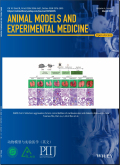首页|期刊导航|Animal Models and Experimental Medicine|How can we establish animal models of HIV-associated lymphoma?
Animal Models and Experimental Medicine2024,Vol.7Issue(4):P.484-496,13.DOI:10.1002/ame2.12409
How can we establish animal models of HIV-associated lymphoma?
摘要
关键词
animal model/HIV-associated lymphoma(HAL)/human immunodeficiency virus(HIV)/immunodeficient mice/primate model分类
医药卫生引用本文复制引用
Qing Xiao,Liuyue Zhai,Xiaomei Zhang,Yi Liu,Jun Li,Xiaoqing Xie,Guofa Xu,Sanxiu He,Huihui Fu,Yifeng Tang,Fujie Zhang,Yao Liu..How can we establish animal models of HIV-associated lymphoma?[J].Animal Models and Experimental Medicine,2024,7(4):P.484-496,13.基金项目
Chongqing Professional Talents Plan,Grant/Award Number:cstc2022ycjh-bgzxm0048 ()
Fundamental Research Funds for the Central Universities,Grant/Award Number:2022CDJYGRH-001 ()
Natural Science Foundation of Chongqing,China,Grant/Award Number:CSTB2022NSCQ-MSX1150。 ()

